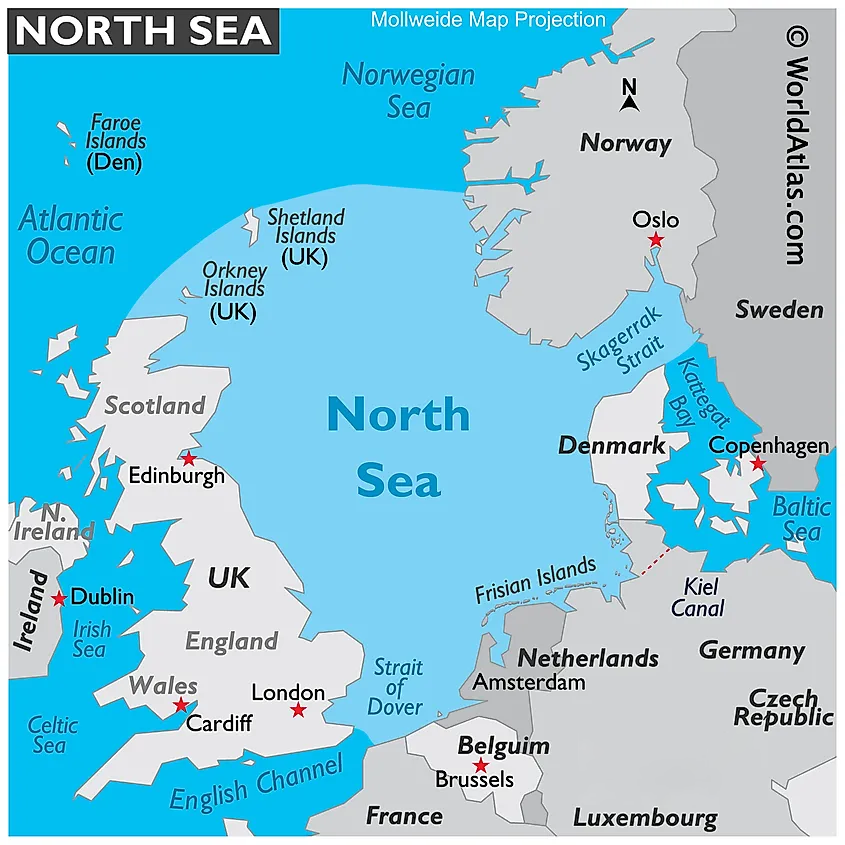Biodiversity & Environment
UK’s North Sea Drilling
- 23 Aug 2023
- 5 min read
For Prelims: UK’s North Sea Drilling, North Sea, 1958 Geneva Convention, U.K. Parliament's Continental Shelf Act of 1964, Net-Zero Emissions.
For Mains: UK’s North Sea Drilling and its Environmental Concerns.
Why in News?
Recently, The Prime Minister of the UK has endorsed plans for additional fossil fuel drilling off the British coast in the North Sea, aiming at enhancing Britain's energy independence, and has raised questions about the U.K.'s commitment to its climate goals.
- The North Sea Transition Authority (NTSA), responsible for regulating the industries for drilling, is overseeing the 33rd offshore oil and gas licensing round.
What is the Evolution of North Sea Drilling?
- About North Sea:
- The North Sea is located in northwest Europe. It is bordered by several countries, including Norway to the east and north, Sweden, Denmark, Germany, the Netherlands and Belgium, France and the United Kingdom.
- It is connected to the Atlantic by the Strait of Dover and the English Channel and opens directly onto the ocean between the Orkney and Shetland islands and between the Shetland Islands and Norway.
- History
- The 1958 Geneva Convention on the Continental Shelf was the first international legislation to establish the rights of countries over the continental shelves adjacent to their coastlines and paved the way for exploration in the North Sea.
- The U.K. Parliament's Continental Shelf Act of 1964 solidified the country's jurisdiction over oil and gas resources beneath the seabed near its shores.
- British Petroleum (BP) secured the first exploration license in the U.K. North Sea in 1964, leading to the discovery of natural gas the following year.
- However, drilling operations faced setbacks, notably the collapse of the BP-operated Sea Gem drilling rig in 1965.
- Subsequently, commercial oil was discovered in the Forties Field, east of Aberdeen, Scotland in 1970, and the North Sea witnessed increased exploration efforts by various companies in the following decades.
- Present Need of UK:
- The UK emphasized that even after achieving Net-Zero Emissions by 2050, a significant portion of the U.K.'s energy needs, about a quarter, would still be reliant on oil and gas.
- The Prime Minister of UK argued that it is preferable to meet these needs using domestic supplies rather than depending on potentially unreliable sources from other nations.
- Despite the U.K.'s commitment to achieving net-zero emissions by 2050, concerns are raised about its adherence to climate targets.
- The Climate Change Committee (CCC) reported in its March 2023 Progress Report that the U.K. had not adequately prepared for climate change under the second National Adaptation Programme.
What are the Environmental Concerns Surrounding Offshore Drilling?
- Oil Spills:
- Offshore drilling operations carry the risk of oil spills, which can have catastrophic effects on marine ecosystems and wildlife. Spilled oil can coat birds, marine mammals, and fish, leading to suffocation, reduced insulation, and impaired ability to find food.
- Marine Ecosystem Disturbance:
- The physical presence of drilling platforms, pipelines, and other infrastructure can disrupt marine habitats.
- The noise and vibrations from drilling operations can harm marine life by disrupting communication, navigation, and breeding patterns.
- Biodiversity Impact:
- The construction of drilling structures can damage underwater habitats, such as coral reefs and seagrass beds, which serve as crucial breeding and feeding grounds for marine species.
- Climate Change:
- Extracting and burning fossil fuels obtained from offshore drilling contributes to greenhouse gas emissions, exacerbating global climate change.
- Offshore drilling also warms oceans, leading to sea-level rise and disruption of ocean currents.
- Resource Depletion:
- Intensive offshore drilling can deplete oil and gas reserves, leading to increased pressure to explore new areas, often in environmentally sensitive regions.
- Acidification:
- Carbon dioxide released from burning fossil fuels is absorbed by oceans, leading to ocean acidification. This acidification harms marine life, particularly organisms with calcium carbonate shells or skeletons, such as coral reefs and shellfish.







